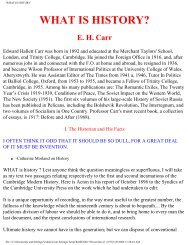The bronze age and the Celtic world - Universal History Library
The bronze age and the Celtic world - Universal History Library
The bronze age and the Celtic world - Universal History Library
Create successful ePaper yourself
Turn your PDF publications into a flip-book with our unique Google optimized e-Paper software.
CONCLUSION 169<br />
such positive evidence. A few of <strong>the</strong> Gaels may have reached Irel<strong>and</strong> from <strong>the</strong> mouth<br />
of <strong>the</strong> Loire, in fact it seems probable that some such movement took place, though<br />
positive archaeological evidence from <strong>the</strong> French side is for <strong>the</strong> present lacking.<br />
Lastly <strong>the</strong>re is an idea prevalent in some quarters that at one time <strong>the</strong>re was in<br />
Europe a great <strong>Celtic</strong> empire. Some writers speak of this as though it had been a Gaelic<br />
empire. I have been unable as yet to trace this superstition to its source. I suspect<br />
that <strong>the</strong> chapters on Brennius in Geoffrey of Monmouth's <strong>History</strong> of <strong>the</strong> Britons' are <strong>the</strong><br />
real foundation for this strange behef , though naturally no-one to-day would base a serious<br />
hypo<strong>the</strong>sis upon so shifty a foundation. M. d'Arbois de Jubainville' seems to rely mainly<br />
on a pass<strong>age</strong> from Livy^ in which <strong>the</strong> writer states that Bellovesus <strong>and</strong> Sigovesus, nephews<br />
of Ambigatus, king of <strong>the</strong> Bituriges, were sent simultaneously on two expeditions. Livy<br />
says nothing of an empire, <strong>and</strong> <strong>the</strong> movements which he dates at 600 B.C. seem to have<br />
occurred 300 years later. Dechelette"* had dealt with this absurd notion according to<br />
its deserts.<br />
<strong>The</strong> empire of Ambigatus, if such a thing existed, must have been a Kimric not<br />
a Gaelic power. But empires, if we are to underst<strong>and</strong> <strong>the</strong> word in <strong>the</strong> sense in which<br />
it is ordinarily used, need settled conditions, such as did not prevail in north or north-<br />
west Europe until <strong>the</strong> arrival in <strong>the</strong> latter region of <strong>the</strong> pax Romana. It is conceivably<br />
possible that among <strong>the</strong> Kimri <strong>the</strong> tribal chiefs paid some form of loose allegiance to<br />
a super-chief, just as <strong>the</strong> Dorians, <strong>and</strong> to some extent <strong>the</strong> Hellenic <strong>world</strong>, recognised,<br />
very occasionally <strong>the</strong> hegemony of Sparta ; but <strong>the</strong> evidence which we possess from<br />
classical sources does not even imply <strong>the</strong> existence of any such over-lordship among <strong>the</strong><br />
Celts. In any case such vague hegemony could only have existed among <strong>the</strong> Kimric<br />
tribes, who for a thous<strong>and</strong> years harried <strong>the</strong> people of <strong>Celtic</strong> l<strong>and</strong>s <strong>and</strong> <strong>the</strong> <strong>Celtic</strong><br />
cradle, Gaelic lords or non-Wiro subjects ahke. Before <strong>the</strong>ir arrival <strong>the</strong> Gaelic chiefs<br />
ruled only in <strong>the</strong> mountain zone, <strong>and</strong> <strong>the</strong> estabhshment of an empire in a mountainous<br />
country, draining into four rivers <strong>and</strong> four seas, would have been more impossible<br />
than in <strong>the</strong> open steppe.<br />
I Geoflrey of Monmouth, ifwi. Byfi. iii. 8-10. 3 Liv. v. 34.<br />
' Jubainville (1904) 80. ! D6chelette (1908-14) ii. 572, 573.







